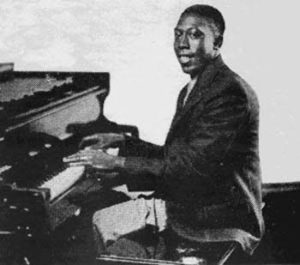
Walter Roland
*Walter Roland was born on this date in 1903. He was a Black blues, boogie-woogie, and jazz pianist, guitarist, and singer.
Roland was born in Ralph, Tuscaloosa County, Alabama. He started playing on the Birmingham blues circuit in the 1920s. A competent and versatile pianist, his range covered slow blues to upbeat, jaunty boogie-woogie numbers. He was also a skilled guitar player and had a forceful singing voice.
Between 1933 and 1935, Roland traveled to New York on three occasions, recording around fifty songs under his name for Banner Records(ARC). In 1933, he recorded "Red Cross Store Blues" (variously "Red Cross Blues"), his cynical viewpoint on welfare benefits. Roland recorded "CWA Blues" about the Civil Works Administration as a counterbalance the following year. In addition to his solo output, Roland also recorded as an accompanist for other artists.
Roland usually accompanied Lucille Bogan on piano, although he sometimes played acoustic guitar backing. During this same period, Roland also accompanied Josh White on several tracks. Bogan's final recordings with Roland and White included two "Shave 'Em Dry" takes, recorded in New York on March 5, 1935. Roland did not record beyond this point and, by 1950, had become a farmer. In the 1960s, he performed as a street musician for several years. He lost sight after intervening in a neighbor's argument when he was inadvertently hit by buckshot.
In the late 1960s, he retired to Fairfield, Alabama, and was cared for by his daughters, having earlier been widowed. Apart from the musicians mentioned above, several notables recorded versions of Roland's songs, including Sonny Boy Williamson II, Big Joe Williams, Booker T. Laury, Kim Simmonds, Koerner, Ray & Glover, Fred McDowell, and Lead Belly. 1994 Document Records released a twin set of all of Roland's solo recordings. He died of lung cancer on October 12, 1972, in Fairfield. The music journalist Gérard Herzhaft stated that Roland was "a great piano player... as comfortable in boogie-woogies as in slow blues," adding that "Roland – with his manner of playing and his singing – was direct and rural."